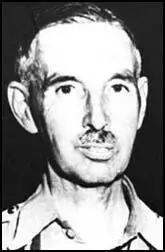Arthur Percival

Arthur Percival was born in 1887. He joined the British Army as a private but by the outbreak of the Second World War had risen to command the 43rd Division of the British Expeditionary Force.
After the Dunkirk evacuation Percival led the 44th Division protecting the English coast during Operation Sealion. In the spring of 1941 was placed in command of British forces in Malaya. He had less than three divisions and although he asked for six more his requests were denied.
On Sunday, 7th December, 1941, 105 high-level bombers, 135 dive-bombers and 81 fighter aircraft attacked the the US Fleet at Pearl Harbor. In their first attack the Japanese sunk the Arizona, Oklahoma, West Virginia and California. The second attack, launched 45 minutes later, hampered by smoke, created less damage. In two hours 18 warships, 188 aircraft and 2,403 servicemen were lost in the attack.
That night the Japanese Army began arriving at Kota Bharu. This was just a diversionary force and the the main landings in the Malay peninsula did not take place until the next day at Singora and Patani on the north-east coast. Under the command of General Tomoyuki Yamashita, the Japanese 18th Division, made rapid progress as they forced Allied troops to retreat south.
On 10th December, 1941, the Prince of Wales and Repulse were both sunk by Japanese aircraft off the coast of Malaya. This left the Japanese Navy in control of the sea and it was able to provide the Japanese Army with the necessary supplies to win the battle with the Allied forces on Malaya.
The British Army in Malaya did not have any tanks whereas the Japanese had over two hundred. The Japanese Air Force were also able to carry out a series of air attacks on Allied positions. Unsuccessful attempts were made to halt the advance of General Tomoyuki Yamashita at Perak River, Kampar and the Muar River.
On 25th January 1942, Percival gave orders for a general retreat across the Johore Strait to the island of Singapore. The island was difficult to defend and on 8th February, 13,000 Japanese troops landed on the northwest corner of the island. The next day another 17,000 arrived in the west. Percival, moved his soldiers to the southern tip of the island but on 15th February he admitted defeat and surrendered his 138,000 soldiers to the Japanese.
It was Britain's most humiliating defeat of the war. Percival and his troops remained prisoners of the Japanese until just before the end of the Second World War.
Arthur Percival, who published The War in Malaya in 1949, died in London in 1966.
